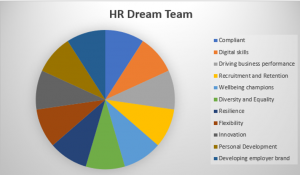The HR industry is thriving, with a projected industry growth of 3.6% in 2018/19[1] but in an everchanging market place, there are various issues and challenges facing HR teams.
We take a closer look at 3 key challenges and how your HR departments can tackle them in order to meet the demands of your organisation and its employees.
- The Influence of Millennials
Millennials, (people born between 1980 and 2000) make up a huge proportion of the workforce and by 2020 it is predicted they will account for 50% of the global workforce. But it isn’t simply the sheer volume of millennials that is the reason they are affecting the workplace, it is a combination of major societal shifts and their lived experience of the economic down turn that has reshaped how they view “work”.
The Millennial generation have had to face up to the realisation that their lives will financially be more difficult than generations before them. Many would have been graduating from university at the height of the economic crisis and were faced with low employment rates. In addition to the slim chance they will be able to get on the housing ladder and the fact they are considered to be the most financially fragile generation it has led them to reject the notion of corporate behaviour and the principles behind it.
Instead, Millennial’s want more than just a job. They want an experience and they want to make a difference.
Fortunately for businesses, this generation are skilled, educated and success driven. Furthermore, in a survey conducted by PWC, 52% of millennials who were questioned said the biggest draw to an employer was the opportunity for progression.[2] Meaning that with the right strategy and culture in place, Millennials can be loyal employees who deliver outstanding results.
So, what does this mean for your HR teams?
It is said that Millennials are less likely than baby boomers to stay in a job they are not happy with, so understanding what makes them tick and providing an environment that they can thrive in will reduce the chances of them leaving your business. Typically, it costs £18,000 to replace a millennial so retaining them will benefit the business financially and operationally.
Recruiters and hiring managers need to be visible in the places millennials visit most, online and on social media sites. 98% of recruiters now use LinkedIn as a sourcing tool and 65% of this generation say they visit a company’s social media sites to look for jobs[3].
Millennials do not want to be constrained by rigid corporate structures, they want flexibility and regular feedback. What drives them is the feeling that their work is being recognised and worthwhile. HR teams can implement tailored review processes to meet these requirements.
- Generational Divide
As the number of Millennials in the workplace increases, what does this mean for the other generations and how do they work together?
The key areas in which it has been noted there is a significant generational difference are:
- Communication style; baby boomers are more reserved, millennials more collaborative. Thinking about your own workplace, are Millennials more or less likely to speak to someone face to face or use technology? Could you encourage them to mix up their approach?
- Adapting to change; baby boomers are typically more cynical when it comes to change where as Millennials often see it as an opportunity for something new. How do your HR teams support change management and are you catering for all generations?
- Learning and training approaches; as one would expect, baby boomers prefer traditional, instructor led approaches compared to Millennials who find technology driven, collaborative approaches work best for them. Can you offer more than one training style?
How HR Teams can respond to this
It is becoming more common for a younger person to be managing older people and this in itself can cause tension. A collaborative approach will make all employees feel their opinions and roles are valued within the company and this will establish a positive and open culture.
Create opportunities for cross generational mentoring, this can be a great way for the tech savvy members of the work force to teach those less familiar whilst building working relationships.
Understand the different needs of your generations. Employees will be at different stages of their lives and will want different things from their employers. Open communication will help HR teams understand what this is and how they can support.
Offer flexibility, whether this be working flexible hours, working from home sometimes or working collaboratively. Having these options will appeal to all generations within your workforce and ensure that you are offering a working pattern that suits them all.
- The jobs market: The rising cost of talent
Businesses are growing and on the whole, the markets are confident, with vacancies and advertised salaries both seeing an increase in the first half of the year.[4]
However, the UK skills gap has been a concern for a while and uncertainty over Brexit has added fuel to the fire. A study by The Open University found that 90% of employers had found it difficult to recruit workers with the required skills in the past 12 months and so had been forced to inflate salaries above the market rate to attract talent, costing at least £527m.[5]
The duration of the recruitment process has become lengthier, pushing up recruitment fees and putting greater pressure on HR departments.
It certainly is a job seekers market and this is set to continue. How can HR teams adapt?
Offering apprenticeships can be a good solution at a ground level, however this does not solve the problem when filling senior or specialist roles.
Put greater emphasis on retaining top talent. Look at strategies on staff engagement, personal development, reward schemes and company culture.
Don’t wait for the Government’s Brexit policies to be decided, up skill your current employees, implement your improved strategies and become an employer of choice.
What do employers want from their HR Teams?

Expectations on HR teams are higher than ever, with workplace mental health and wellbeing at the forefront of media discussion, GDPR legislations and the increasing rising cost of talent just to name a few challenges, it is undoubtably a fast moving, demanding time.
It is clear that the effective use of HR practices improves business performance by increasing staff engagement levels, decreasing turnover rates and improving profit margins. Therefore, in the current climate it is more important that ever that HR teams have a strategy in place that works.
A well-defined strategy clarifies the role of the HR team. It determines the size, structure and cost of the resource required to deliver it. Most importantly, it ensures that all HR activity is aligned to business needs – joined-up HR!
Key things to think about when developing your strategy include:
- Leadership
- Company culture
- Recruitment and retention
- Talent planning
- Learning and Development
- Reward schemes
- Change management
- Corporate governance and compliance
- Corporate Responsibility
Human Resourcing
This analysis has been produced by Mera Mann, Director of Human Resourcing. We are South Wales’s longest established independent recruitment consultancy, celebrating seventeen years of trading in 2018. We specialise in the appointment of Executive HR, Human Resources, Training, and Health & Safety personnel.
Our ethos is to offer an authentic recruitment service to our clients and candidates by prioritising honesty and confidentiality at all times. We pride ourselves on delivering a personalised, tailored service, maintaining close relationships with those we work with. With most of our vacancies coming from personal recommendations and ongoing referrals, this has been key to our success.
If you are looking for specialist HR recruitment support, we’d love to help your business. Visit our website for ways to get in touch www.humanresourcing.co.uk
[1] The Recruitment and Employment Confederation (REC)’s Recruitment Industry Trends 2016/17 report
[2] PWC Millennials at work; reshaping the workplace report
[3] https://theundercoverrecruiter.com/hiring-in-digital-age
[4] https://www.cv-library.co.uk/recruitment-insight/uk-job-market-flourishes-first-quarter-2018/
[5] https://www.telegraph.co.uk/business/2017/07/02/skills-gap-hitting-uk-plc-tune-22bn-says-open-university/

